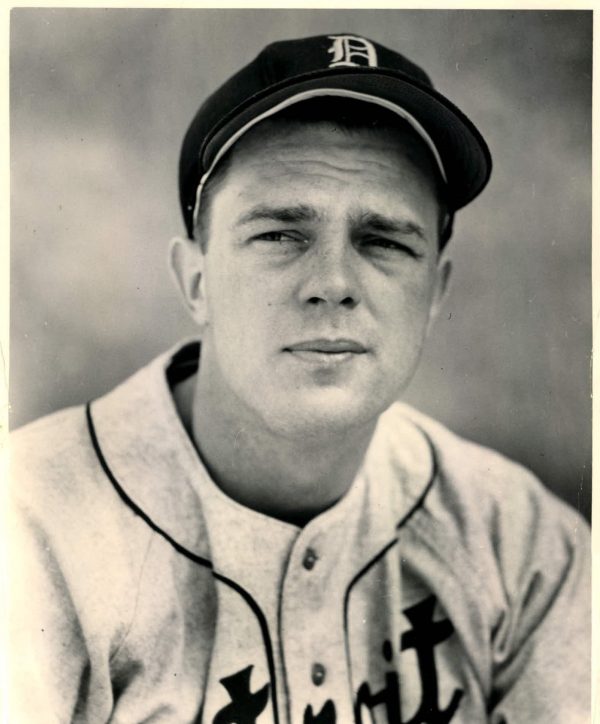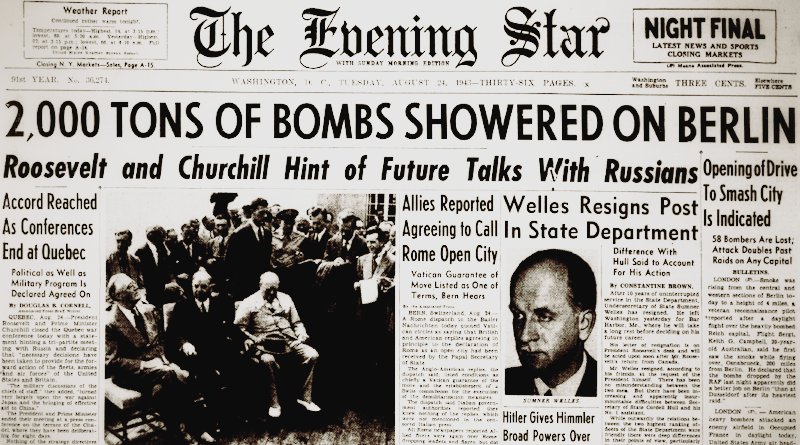World War II Chronicle: August 24, 1943
Click here for TODAY’S NEWSPAPER
Detroit Tigers rookie sensation Dick Wakefield will report to the Navy tomorrow to be sworn in (see front page). The outfielder will get to finish the season before he begins training as a Naval aviator, and has played spectacularly so far. Wakefield is batting .330, just ahead of Chicago’s Luke Appling. Detroit seems to have gotten their money’s worth: Wakefield will play every inning of every Tigers game this season, and collects more hits than any junior circuit batter…

George Fielding Eliot column on page eight… We learn on page 12 that Winston Churchill came close to being killed during the Blitz in November 1940. German bombers targeted the Treasury Building next door to No. 10 Downing Street, where he was dining with ministers. It is interesting to think how devastating it would have been to the Allied cause if the bombs hit just a few feet away and killed the prime minister… Sports section begins on page 13…
Land mines have caused more casualties in the African Theater than small arms and artillery, and the Army is training its soldiers how to detect and clear mine fields (page 14). Ignorance and carelessness of our own troops are apparently more a factor than cleverly hidden mines… A correspondent tells his story of the Battle of Viru Harbor on page 20.
Roving Reporter by Ernie Pyle
SOMEWHERE IN SICILY — Men who work under Lieut. Gen. Omar N. Bradley say he is the fairest man they have ever known. There is absolutely no pretense about him in any way, and he hates ostentation.
He doesn’t fly his three-star flag except when formal occasions compel it. And his aides are full of stories about how he has hung in the background rather than call attention to himself by pushing up where he had a right to be. He doesn’t even own a Sam Browne belt or a dress cap.
Oddly enough, for a man as quiet and modest as he is, he doesn’t mind public speaking. He is no ringing orator, but after you listen to him for a while his speech becomes powerful by its tone of intense sincerity.
During vital periods of each campaign the General always comes up to our correspondents’ camp and, in front of a big map gives up a complete fill-in on the situation. When he first did this we all liked him but weren’t especially impressed. But he grew on us just as he grows on everybody he works with, and today there isn’t a correspondent who doesn’t swear by him.
Despite his mildness the General is not what you would call easy-going. Nobody runs over him. He has complete confidence in himself, and once he makes up his mind nothing sways him. He is as resolved as rock, and people who work with him must produce or get out. They don’t get the traditional Army bawling-out from him, but they get the gate.
He has a nice quality of respecting other people’s opinions and of paying close attention to other people’s conversation. I have noticed that when he makes a phone call he always says “if you please” to the Army operator. And on the road, when an Army truck pulls out to let his three-star jeep pass, he always turns and says “Thank you” to the driver.
When he passes a bunch of engineers toiling and sweating to create a by-pass around a blown-up bridge he calls out, “You’re doing a nice job here,” to the startled lieutenant in charge.
The General rides around the front a great deal. During the campaign in Northern Sicily he averaged five hours a day in his jeep, and sometimes ran it up to eight. He laughs and says jeep riding is good for the liver.
A few times he used planes. He hopes soon to have a small plane of his own that will land practically anywhere, as it would save him hours each day.
On the front bumper of the General’s jeep is a red-and-white plate displaying three stars, and of course this draws a salute from every officer or soldier who is on his toes. In heavy traffic the General is returning salutes constantly. I told him that what he needed most was a little boy to do his saluting for him. He laughed and said, “Oh, that’s the way I get my exercise.”
When he drives through a town the Sicilians all yell and wave, and the General waves back. Italian policemen, discharged soldiers and even civilians snap up to the salute, and the General always salutes them back. Once in a while they give him the Fascist salute, out of old habit, and he returns that too but in the American way.
He doesn’t affect a swagger stick, but he does sometimes carry an ordinary wooden cane with a steel spike in the end. It was given to him by former Congressman Faddis of Pennsylvania.
Almost every day he visits the headquarters of each division that is in the lines. He says he could do the work by telephone, but by going in person he can talk things over with the whole division staff, and if they are planning something he doesn’t think is good he can talk them around to seeing it his way, rather than just flatly ordering it done.
I stood with him one day on a high observation post looking ahead at a town where we were having very tough going. The Germans simply wouldn’t crack (They did later, of course). All of our officers, including the General, were worried. He said:
“We’ve put enough pressure on already to break this situation, but still they hang on so we’ll have to figure out some other way. Some commanders believe in the theory of direct attack, accepting a 30% loss of men and getting to your objective quickly, but I’ve tried to figure a plan for this to save as many lives as possible.”
I said to him, “I never could be a general. I couldn’t stand up under the responsibility of making a decision that would take human lives.”
And he said: “Well you don’t sleep any too well from it. But we’re in it now, and we can’t get out without some loss of life. I hate like the devil to order the bombing of a city, and yet it sometimes simply has to be done.”
In speaking of being bombed and of enduring the sadness of our own casualties, he said:
It’s really harder on some of the newer officers than it is on me. For although I don’t like it, after all I’ve spent thirty years preparing a frame of mind for accepting such a thing.
More tomorrow.
Evening star. (Washington, D.C.), 24 August 1943. Chronicling America: Historic American Newspapers. Lib. of Congress.
https://chroniclingamerica.loc.gov/lccn/sn83045462/1943-08-24/ed-1/
